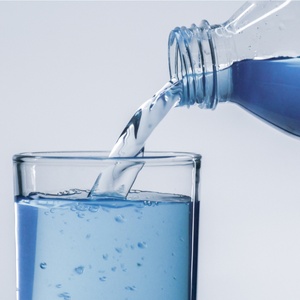Blog
Welcome to FaceForward
Get the scoop on all things beauty, wellness, and skincare.

Water plays an essential role in total body health and general well-being.
People who don’t drink enough water daily over prolonged periods can deal with side effects of mild dehydration that they may not even recognize as being related, like headaches and (worse) painful kidney stones.
What does hydration mean for skin health? Your skin is the largest organ in your body, and all organs need adequate moisture to function properly.
If you have breakouts, you may have heard that dehydration can contribute. So does drinking water help with acne? While there’s limited scientific research on the matter, dermatologists absolutely recognize the benefits of hydration for skin wellness.
Surprisingly with water being such a popular commodity these days – alkaline, added electrolytes, and everything in between – few researchers have investigated its effect on acne specifically, though there's a little more on water and skin physiology.
There is a visible difference in skin that lacks moisture. It’s tighter, drier, and flakier. The available research shows that water positively benefits the skin. But does drinking water help with acne?
One published research study showed that dry skin may cause acne because it stimulates excess oil (sebum) production. A later review of fluid intake studies showed that hydration of the outer skin layer decreased dryness, especially in individuals whose consumption of water was previously lower. Thus, there appears to be a correlation between water consumption and skin health, which may provide a direct benefit to your acne condition.
Drinking enough water each day hydrates your skin tissue and provides greater elasticity. A better functioning skin surface may mean a reduction in the triggers that cause acne. Here are some ways drinking water supports your health:
The oil and dirt on your skin surface that contribute to clogged pores, called comedones, can be balanced through hydration. Adding water to your daily routine may help to lessen acne breakouts and blemishes.
Acne problems involve your oil glands (sebaceous glands) and hair follicles. Oils (sebum) are emitted through these glands to moisten the skin. If they get clogged with dirt, bacteria, and oil buildup, pimples and pustules can form.
One study that looked at the relationship between acne and diet found foods rich in nutrients and metabolites impact skin hydration.
A big factor, though rarely seen in developed countries, is Vitamin A deficiency. Vitamin A deficiency leads to dry skin, dry hair and broken fingernails as some of its first manifestations. This is particularly interesting in that retinoids like retinol and tretinoin (which are Vitamin A derivatives) are powerful skin health boosters.
Essential fatty acids can also be associated with a variety of skin problems. “Dry, itchy, scaly skin is a hallmark sign of fatty acid deficiency,” say these researchers. “The sebum of acne patients is relatively deficient in linoleic acid.”
The list goes on. One interesting finding is that those of us who adhere to a typically Western diet are more prone to acne, while traditionally Eastern diets with higher fish intake and fewer refined carbohydrates tend to have less acne.
To boil it down, more whole fruits and vegetables, lean proteins like fish, less sugar, and fewer refined carbohydrates are all good for skin health.
Perhaps you feel down because you’re trying to stay hydrated and are questioning whether drinking water helps with acne.
Drinking water is a support mechanism for the body, but dermatology treatment and proper skin care can help get to the root of your skin issues. Here are three key factors that increase the risk of getting acne:
Remember that drinking enough water is one practice to help support your body’s defenses and protect against bacteria and other skin conditions that lead to acne.
You may have heard that acne is caused by not being clean enough. Acne is not typically a result of having dirty skin. While maintaining normal bathing routines can help, obsessive cleaning rituals can sometimes actually worsen skin conditions. More frequently, acne stems from underlying biology, hormones, and genetics more than cleanliness.
Another common assumption is that acne comes from eating greasy foods or sweets. Diet does help support healthy body functions that promote better skin health, and diets heavy in refined carbs aren’t great for skin health. Does that mean you have to go sugar-free? Not at all, but be cognizant that 40 ounces of soda daily isn’t great for your skin health – or wellbeing in general.
Cosmetics have a bad rap in acne circles. There are many oil-free makeups that don’t affect acne conditions. Take the time to look for products that won’t clog your pores or cause agitation, often called non-comedogenic.
Acne that’s severe affects self-esteem; it can be incredibly frustrating; and it can even be physically painful.
And, it may not clear up with over-the-counter medications. Dermatologists have a variety of more powerful medications than those you can get in stores, including prescription-grade ingredients like tretinoin and other retinoids, and they may even deploy antibiotics and anti-inflammatory medications.
If you're concerned about the severity of your acne, or you're just ready for effective treatment, telehealth is making dermatology more affordable and accessible than ever before.
Nava MD can help you get the clinical skincare treatment you need, for the outcome you deserve.
With our online system, you complete a comprehensive questionnaire, submit your photos, and if approved by our clinicians, you receive a custom-formulated prescription by mail. Our formulations are dermatologist-recommended and selected for your specific situation.
Your prescription is sent through our partner U.S. pharmacy, and care is ongoing: you can message your clinician any time through the Nava MD Member Portal. It's easy and affordable.
Click here to start your free consultation.
https://www.ncbi.nlm.nih.gov/pmc/articles/PMC3051853/
https://pubmed.ncbi.nlm.nih.gov/29392767/
https://ssihi.uci.edu/tip/hydration-for-immune-system/
https://www.ncbi.nlm.nih.gov/pmc/articles/PMC2836431/
This article is intended for informational purposes only and should not be considered medical advice.
Consult a healthcare professional or call a doctor in the case of a medical emergency